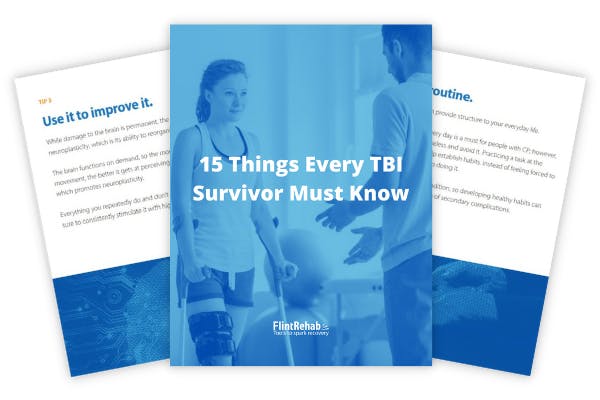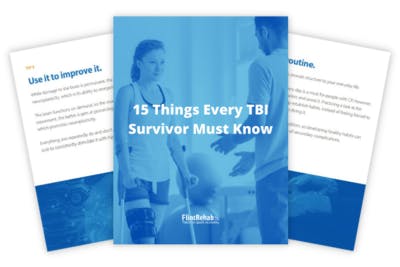No products in the cart.
No products in the cart.
No products in the cart.
No products in the cart.
Home » Neurological Recovery Blog » Traumatic Brain Injury » Understanding Lack of Empathy After Brain Injury and How to Cope
Last updated on March 18, 2020

Lack of empathy after brain injury can cause TBI patients to appear more self-centered than they used to.
However, this behavior does not mean your loved one is actually selfish. Their injury has just made it harder for them to identify the emotions of others.
Today you will learn why a brain injury can lead to a lack of empathy, plus what therapies can help people regain their empathy skills.

Empathy is the ability to see things from another person’s perspective and feel what they feel.
Multiple areas of the frontal lobe play a role in empathy skills. For example, the right supramarginal gyrus helps people overcome egocentric bias (self-centeredness) when making decisions.
The orbitofrontal cortex is another area of the brain that helps us react to another person’s feelings. Therefore, if any of these brain regions become damaged, a lack of empathy can occur.
Other cognitive and behavioral problems that can accompany a lack of empathy after a brain injury include:
It’s important to note that even though the person may display these behaviors, they are not fully responsible for them. Family members and friends should try not to take anything their loved one says or does personally during this time.
Sometimes TBI patients can still empathize with others, but they have trouble processing their emotions. This condition, called alexithymia, is also common in individuals with autism.
Alexithymia causes difficulties in identifying, describing, and processing one’s own emotions and those of others. It also makes it hard to distinguish bodily sensations from emotional feelings.
This can lead people to seem insensitive and non-empathetic when in fact they do experience the emotions of other persons. They just do not know how to react.
It can be difficult to distinguish alexithymia from a true lack of empathy. A neuropsychologist can help you get a proper diagnosis and teach you ways to process emotions again.
Some brain injury side effects, such as a lack of empathy, can go away on their own. As their frontal lobe injury heals, you may notice your loved one becoming more responsive to others again.
Even if this does not occur naturally, it may still be possible to relearn empathy. Empathy is a skill, and like all skills, it can be improved through deliberate practice.
This is what the field of positive psychology is based on. Positive psychology, like the name suggests, is a method used to help train the brain to rest in more positive states.
For instance, by writing in a gratitude journal daily, you can help train the brain to notice more things to be grateful for. The repetitive practice of searching for gratitude helps the brain become more efficient at the skill of noticing things to be grateful for.
Some research suggests that empathy can be learned, too. But this research is broad. There are no studies specifically within the TBI field proving that practicing empathy helps improve empathy.
However, the principle of deliberate practice is clear: the brain becomes more efficient at the tasks that you repetitively practice, including emotion.
If your loved one is receptive to it, practicing empathy as a skill could be worth trying.

It is possible that your loved one’s empathy skills never return. However, that does not mean that they can never be compassionate again.
To understand how this can be true, we will need to discuss how empathy works. Most psychologists believe there are three different types of empathy:
Even if patients lack cognitive or emotional empathy, they can still practice compassionate empathy. That’s because compassionate empathy involves actions and behavior, something most TBI survivors can more easily grasp.
While cognitive and emotional empathy can make it much easier to practice compassionate empathy, it is possible to be compassionate without them.
Depending on how severe the person’s cognitive deficits are, it may require a lot of work to help them learn how to respond compassionately again. It can be especially difficult if the person suffers from a lack of insight since that can make it hard for them to understand their own behavior.
But with help from a behavioral therapist, patients can learn how to control their behavior and recognize when to help others.
Even though it is possible for TBI survivors to regain empathy, it will take time.
In the meantime, here are some steps that family members can take to help their loved ones improve their empathy skills.

It’s important to give feedback to your loved one about their behavior, otherwise, they will never improve.
For example, if they do something rude or inappropriate, gently but firmly let them know. Try your best not to embarrass them, but make sure they understand they can’t do that anymore. It’s very likely they didn’t even realize they were acting selfishly.
In the same way, if they show empathy and compassion, give them praise. Direct their attention to specific instances when they were considerate of another person, and congratulate them. This helps them learn which behaviors are positive and which are negative.
Second, try to direct the person’s attention to the feelings of others. This can help them develop a better awareness of another person’s emotions.
One thing you can do is ask them questions about the people they see throughout the day and how they might feel.
For instance, if they saw a mother at a store with three little ones, try asking them what they think the mother was feeling. Was she stressed, tired, or anxious? Then, ask how they might feel if they had to take a child out shopping.
This exercise can help them practice putting themselves in another’s shoes.

Lack of empathy after brain injury can make it hard for patients to maintain relationships. Therefore, it is helpful to remind them how to keep their friendships alive, especially if they struggle with social skills.
Some things you can remind them to do include:
Again, the more the person can practice these skills, the more they will improve.
Patients with low empathy can sometimes appear aggressive, dismissive, and demanding.
If your loved one acts this way to you, don’t take it personally. Remember they are not in complete control. They just have a lot more emotions and fewer inhibitions now, and they are struggling to cope.
A person who suffers a brain injury may experience a lack of empathy, especially if they damaged their frontal lobe.
Fortunately, the brain can be rewired to learn empathy again with the right therapy.
Even if empathy never returns, your loved one can still relearn how to practice compassion to others. While it might take a lot of patience and dedication, they can eventually improve.

If you like our content, you’ll love our ebook and newsletters! Get instant access to our TBI recovery tips ebook with 20 pages of helpful advice by signing up below.
You’ll also receive our emails that share survivor stories and more useful TBI recovery tips, which you can opt out of at any time. (We know you’ll love them, too.)
We will never sell your email address, and we never spam. That we promise.


Time with a speech therapist is extremely valuable during recovery, especially if you struggle with communication, critical thinking, or memory after brain injury. Insurance typically covers speech therapy for a fixed amount of time. But once it’s over, recovery is in your hands.
That’s why a team of neuroscientists and clinicians from Boston University created the CT Speech & Cognitive Therapy app. Designed for those recovering from stroke, TBI, or living with neurological conditions, the app contains over 100,000 cognitive exercises that are all available right from your phone or tablet. That’s like having a speech therapist by your side whenever you want!
This app is the perfect fit if you want to improve your speaking, memory, or general mental sharpness. And, it’s affordable at just $29.99/month!
“For the past 6 months, my son has used the app about three times a week. The app is like a virtual therapist, it’s very easy to use, and it gives him immediate feedback.
He now understands things faster, can make decisions with less hesitation, has improved recognition of words, and his confidence is higher. I also find it easy to get in touch with customer service; they pleasantly help out. The whole experience has been great.”
— Miriam
With the CT App, you can get the guidance you need right from your phone or tablet. You can use it on your own or in between sessions with your speech therapist.
Whether you struggle with aphasia, memory loss, or critical thinking, the CT Speech & Cognitive Therapy App can help.
“The CT app has helped me gather my confidence by building on and reinforcing old forgotten skills. It helps to see my percentages increase, and work harder when they decrease. It’s very self-motivating.” -Kathryn
We are confident that this app will help improve your speech and cognitive function after brain injury. Like our recovery tools, the CT App is also covered by our 30-day money-back guarantee.

Do you know these 15 TBI recovery tips?
Get a free copy of our ebook 15 Things Every TBI Survivor Must Know. Click here to get instant access.
Grab a free rehab exercise ebook!
Sign up to receive a free PDF ebook with recovery exercises for stroke, traumatic brain injury, or spinal cord injury below: